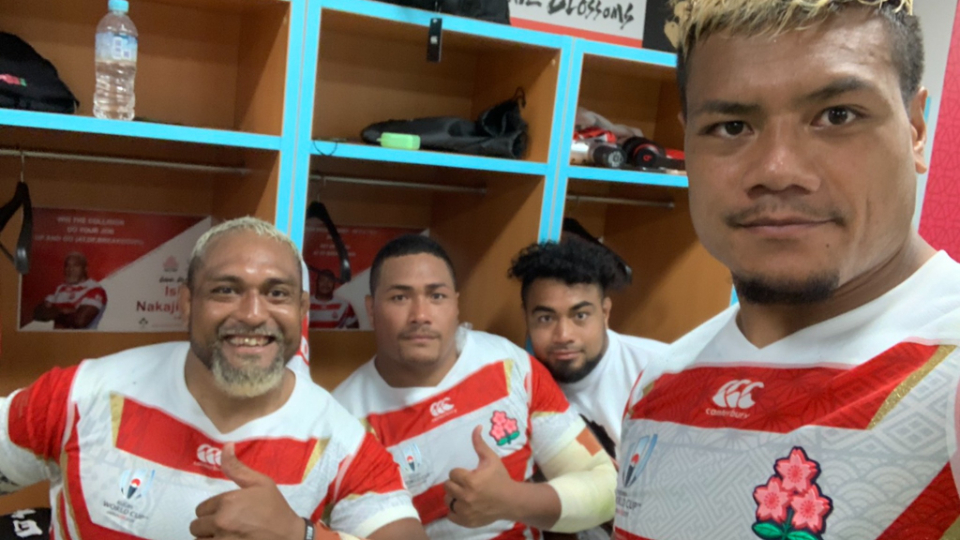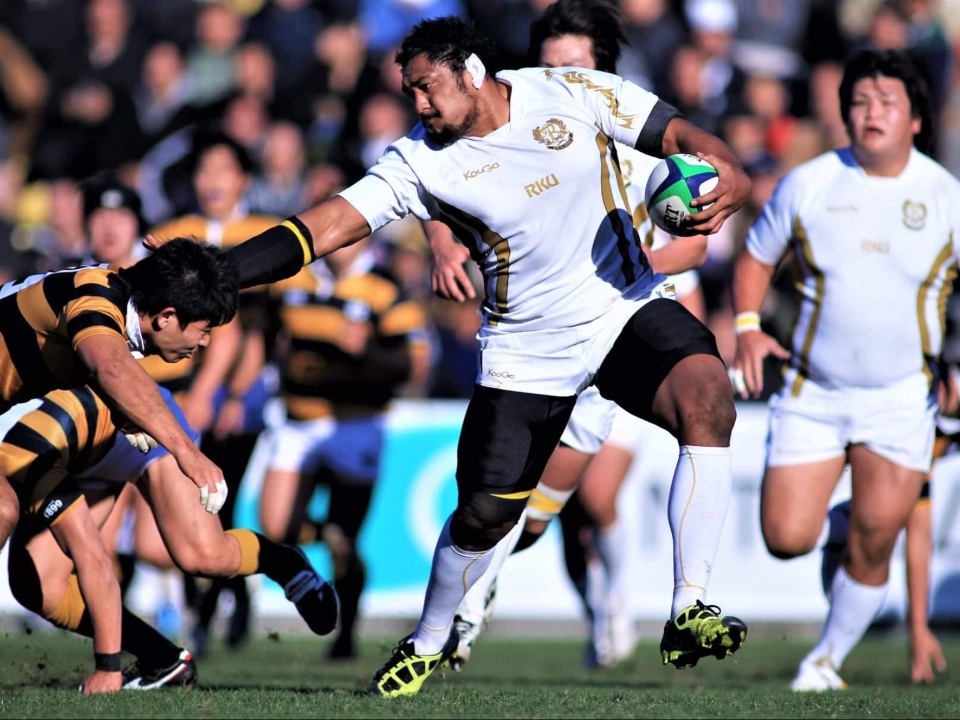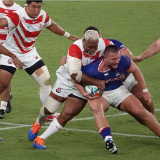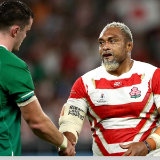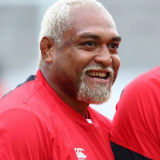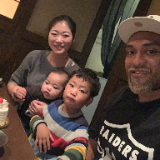| Isileli Nakajima (on left) and his teammates in the locker room, excited to get a chance in the 2019 Rugby World Cup representing Japan. 2020 by Intellectual Reserve, Inc. All rights reserved. | 1 / 12 |
What motivates Japanese rugby star, Isileli Vakauta Nakajima, is not money or fame, but his family and his faith in God. Currently a member of the Kobelco Steelers and a member of the 2019 Japan Rugby World Cup Team, Isileli was born in Vaiola, Tonga, in 1989. A member of The Church of Jesus Christ of Latter-day Saints, he was captain of the Liahona High School rugby team in Tongatapu. While leading his team to their first ever championship, he drew the attention of rugby coaches and was offered a scholarship to play for a university in New Zealand, where rugby is king.
However, during one of his games, a coach from Japan came to watch. The coach came to find one player for his team. After watching the game, he offered Isileli that scholarship. Not knowing anything about Japan, Isileli consulted with his father, Sione Vakauta. Brother Vakauta was impressed that his son should go and play in Japan, where he could both study and play rugby. Isileli humbly accepted his father’s decision and set off to play for the Ryutsu Kezai University in 2008.
Prior to coming to Japan, Isileli thought the weather would be similar to his home country of Tonga. After all, it is an island country. However, arriving in winter in his summer clothes, he quickly learned how cold Japan can be. The coaching staff set out to buy him winter clothes, but standing at over 6 feet tall, they had some difficulty. Isileli was initially surprised with how close the homes were to each other, but was impressed with how clean everything was. He was also impressed with the kindness and politeness of the Japanese people. “They all looked so young, and small,” he added.
He was also impressed with the ‘give it all’ spirit of his teammates. On one of his first training exercises at Ryutsu Kezai University, the coach took the team to run steps up a very steep hill, 80 meters in length. Isileli found the climb very difficult, feeling like it took several minutes to get to the top. After the team returned to the base of the stairs, the coach informed them he expected them to do it in 20 seconds. “The coach is crazy,” Isileli thought. However, after practice, many of his Japanese teammates were doing it in 18 or 19 seconds. In his four years at the university, Islieli did lead them to their first ever championship. However, he did not make it up the hill in 20 seconds, even though he gave it his all.
After graduating in Sports Science, Isileli signed to play for the NEC Green Rockets in Abiko, Chiba, Japan. It is while playing there that he met and married Rieko Nakajima. To show his love and respect for his wife, he chose to go by her family name, Nakajima. This may appear to be an unusual choice, but Nakajima became increasing aware and willing to reject the patriarchal norms of his home country. “I saw a lot of problems where I was raised, like abuse of women and stuff like that. My experience in Japan has taught me a lot about discipline and I want to pass those values on to my sons.”
Nakajima signed with the Kobelco Steelers Rugby Club in 2017, making his debut against New Zealand in 2018. Playing lock #8, he helped them win the Top League championship in 2018-19. At that time, selections were about to be made for the upcoming Rugby World Cup to be held in Japan. Unfortunately, one month before the selections were to be made, Nakajima injured his knee.
Prior to selecting the team for the World Cup, coach Jamie Joseph asked Isileli to consider changing positions to prop #1. Props are typically larger in stature, and use their strength to move the scrum, whereas locks play on the wings and pass and block for the ball carriers. Nakajima replied that he would need to get the permission of his Steeler coaches, who told him, “if you change to prop you will probably be the best in the world.” Following this advice, he made the change.
Being injured, Nakajima did not expect to be selected for the National Rugby Team. The coach told him that if he could play at least one scrum before the selection meeting, he could be considered, which, after intense rehab, he was able to do. He performed well in the scrum held the day prior to selections.
Still, with so many good players, and no experience playing prop, Isileli sat nervously awaiting the team to be announced. Only two props and one reserve were needed. He heard the first prop announced. It was not him. He waited, not hearing anything, but he saw his name on the screen. He froze. “It felt like I was in a dream. Are they joking?” he wondered. But it was true.
His teammates waited for some reaction from Isileli, but he just sat there, ever-so-slightly moving his lips. Some wondered who he was talking to. But, unbeknownst to his teammates, he was saying a silent prayer of gratitude to his Heavenly Father.
Still, many questioned his selection, wondering if he was fully recovered, or able to play the prop position. They did not feel he could make a difference. This motivated him to prove them wrong.
Nakajima is so impressed with his teammates and Japanese athletes. “They love being athletes,” he began. “They give it their all and never give up. At practice, if they do something wrong, they do it again and again until it is perfect. They love their teammates. We have a spirit of unity.”
Isileli was very nervous as he entered the Shizuoka stadium for the first World Cup game. There were so many people. As he ran in, he thought of his family. He could do this for them.
As the host of the 2019 Rugby World Cup, expectations were high for the Japan Rugby Team. They did not disappoint, as in their first meet, they beat Russia, 30-10. This set up a highly anticipated match with 2nd-ranked Ireland, who were heavy favorites. Japan shocked the rugby world by beating them 19-12. Next, they played Samoa, beating them 38-12. This set up a game with another of the world’s rugby powers, Scotland, for a place in the quarterfinals. Japan had never advanced to the quarterfinals before.
“The game against Scotland was the pinnacle of my career. No one expected us to win. There was a lot of trash talk before the game,” Nakajima reported. “Their coach and the team were trying to make us angry, saying, ‘you can’t beat us.’ But, we were humble and focused on our game plan and playing rugby. They were not.”
Japan pulled out to an early lead, but Scotland pulled closer. Holding the ball and a 28-21 lead, Japan worked hard for the last several minutes to keep the ball out of the hands of the Scotland players. “Those were the longest ten seconds of my life,” Isileli stated as he watched the clock tick down. “I never thought it was going to end.” As the gun sounded, Nakajima and his teammates cheered, having accomplished something no Japanese team had done before, qualifying for the quarterfinals. In particular, Isileli was elated.
The team became the pride of the nation, and although they were eliminated in the next game by eventual champion South Africa, rugby had become popular in Japan.
Since the conclusion of the World Cup, Nakajima has been interviewed by many newspaper reporters and on television countless times. With his dyed blond hair and big smile, he finds it difficult to go anywhere to eat without being recognized. “It is amazing how happy everyone is for us. Rugby has found its place in Japan.”
That popularity is growing among young people. At a recent rugby clinic with over 100 youth participants, Isileli asked them, “When did you start playing rugby?” All but five said they started after watching the Japanese team in the World Cup. Nakajima is happy about this. His desire is to help young people achieve their dreams.
This desire extends to his family, which Isileli values above all else. Together with Rieko, who is not a member of the Church, they have two sons, 4 years old and one year old. Rieko is his motivation.
“Family is the center of our religion,” Isileli said. “I am a private person when it comes to religion, but I always have a prayer in my heart. Through prayer, I receive inspiration and blessings that helps my two sons and my wife. Everything I do, I do for them.”
Although large in stature, Isileli is a grateful, humble man, who cares deeply for his family. With moistened eyes he spoke of how Rieko supports him and his sons going to church. She has also invited the missionaries into their home on occasion.
“She has questions, and that makes me happy,” Isileli reflected. “She said ‘it will be hard for me to understand your religion, but I will support you and the boys if they want to go on missions.’”
When they had their first child, Rieko said that she did not know how to raise a family. Both Rieko’s and Isileli’s parents are divorced. She has learned how to love and raise a family from watching him. From him she learned the importance of family.
“I cannot change the rest of the world, but I can change things for my little family,” Nakajima stated. “I love the gospel and the prophet. I am motivated by my family. It is God’s plan. I will be patient and keep them safe and give them love.”
With patience and gratitude, Isileli will continue to let his light shine through example on the field and in his new home in Japan.
